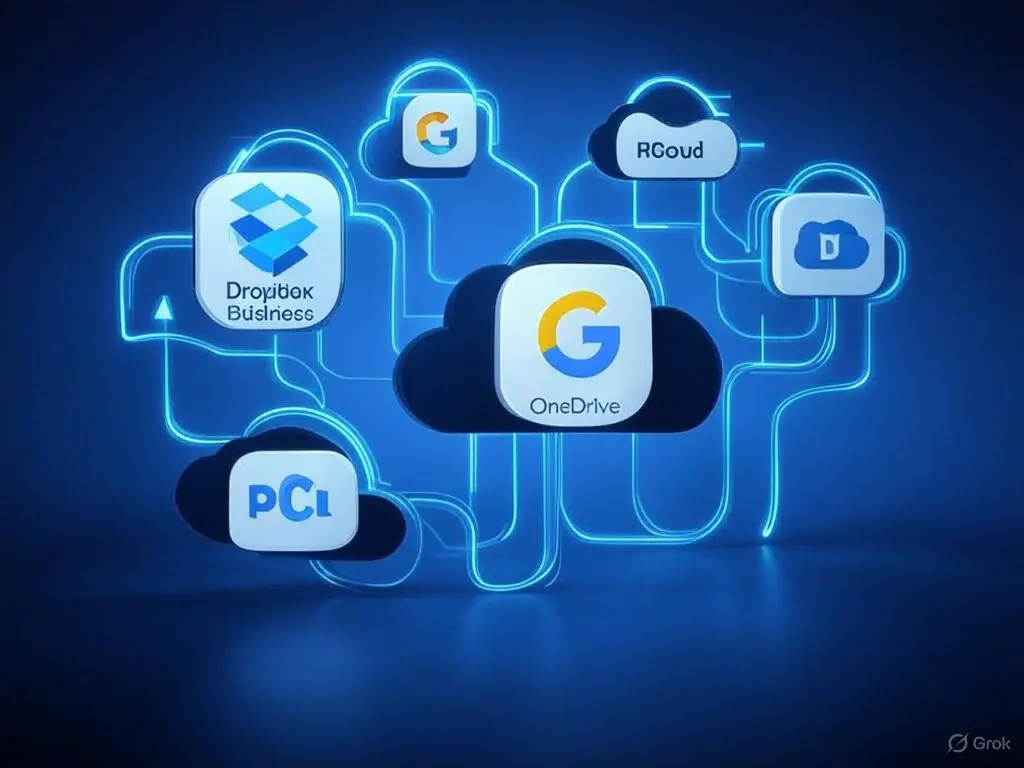Starting a business is thrilling—new ideas, big dreams, and endless possibilities! But as a startup founder, you’re likely juggling tight budgets while your data needs grow rapidly.
Whether it’s storing client contracts, sharing design files, or backing up critical data, affordable cloud storage is a game-changer. It lets you scale without splurging on expensive servers or IT staff.
In this 2025 guide, we’ll explore the best budget-friendly cloud storage solutions for startups, compare their features, and share expert tips to help you pick the perfect fit.
Let’s find the right storage solution to fuel your startup’s growth!
Why Cloud Storage Matters for Startups
Cloud storage lets you store, access, and share files securely from anywhere—no pricey hardware required. For startups in 2025, this means:
✅ Lower Upfront Costs: Skip the expense of physical servers and maintenance.
✅ Seamless Collaboration: Remote teams can access files 24/7, boosting productivity.
✅ Scalability: Easily upgrade storage as your business grows.
✅ Data Safety: Automatic backups protect against data loss from hardware failures.
Picture this: your team collaborates on a pitch deck in real-time, securely backs up customer data, and scales storage as your user base grows—all without breaking the bank.
A reliable cloud storage provider ensures your data stays safe, accessible, and flexible, letting you focus on building your startup.
Top 5 Affordable Cloud Storage Solutions for Startups (2025)

Here’s a curated list of budget-friendly cloud storage providers for startups, updated for 2025:
| Provider | Starting Price | Free Tier | Key Features | Best For |
|---|---|---|---|---|
| Google Workspace | $6/user/month (30GB) | 15GB free/user | Gmail, Drive, Docs, AI-powered file organization | Collaboration-focused startups |
| Dropbox Business | $12.50/user/month (5TB shared) | 2GB free | Smart Sync, integrations, team folders | Media-heavy startups |
| OneDrive Business | $5/user/month (1TB) | 5GB free | Office apps integration, HIPAA compliance | Microsoft ecosystem users |
| pCloud | $49.99/year (500GB) | 10GB free | Lifetime plans, client-side encryption | Long-term storage savings |
| Backblaze B2 | $5/TB/month | Pay-as-you-go | S3-compatible API, 99.9% uptime SLA | Backup-focused startups |
Provider Highlights:
- Google Workspace: Perfect for startups using Google Docs and Gmail. Its AI tools (powered by Gemini in 2025) auto-organize files and suggest edits in Docs, saving time for busy teams. The $6/user/month plan includes 30GB of Drive storage per user.
- Dropbox Business: Excels at syncing large files (e.g., 4K videos) with Smart Sync to access files without taking up local storage. Offers 5TB shared storage starting at $12.50/user/month, ideal for design or media teams.
- OneDrive Business: Seamlessly integrates with Microsoft 365, providing 1TB storage per user and HIPAA compliance for health-tech startups. The $5/user/month plan includes Word, Excel, and Teams.
- pCloud: Stands out with lifetime plans (e.g., $199 for 2TB forever) and client-side encryption, ensuring GDPR compliance for EU-based startups. The free tier offers 10GB but lacks advanced sharing features.
- Backblaze B2: Best for backups, with scalable storage (1TB to 100TB) and an S3-compatible API for developers. Its $5/TB/month pricing and 99.9% uptime SLA make it a reliable choice for data-heavy startups.
Real-World Case Study: How a Startup Saved with pCloud
Take Sarah, founder of a 10-person e-commerce startup. Her team needed secure storage for product images and customer data but couldn’t afford monthly subscriptions long-term.
After testing free tiers, they chose pCloud’s lifetime plan ($199 for 2TB). With client-side encryption, they met GDPR requirements for their EU customers, and the one-time payment saved them 40% over three years compared to Dropbox Business.
“It was a no-brainer for us,” Sarah says. “We got secure, scalable storage without the recurring costs.”
Read More: GTA VI Release Delayed: Now Expected in May 2026
Expert Tips for Choosing Cloud Storage
Picking the right cloud storage for your startup isn’t just about price—it’s about fit. Here’s what to consider:
👉 Estimate Your Storage Needs: Start by calculating current usage (e.g., 100GB for documents, 500GB for media). Plan for growth—will you need 1TB in a year? Choose a provider with flexible upgrades, like Backblaze B2’s pay-as-you-go model.
👉 Check Integration & Compatibility: Ensure the storage works with your tools. Google Workspace integrates with Slack and Trello; OneDrive syncs seamlessly with Microsoft Teams. Test integrations during free trials.
👉 Prioritize Security & Compliance: Look for features like end-to-end encryption (pCloud) or compliance with GDPR, HIPAA, or SOC 2 (OneDrive, Google Workspace). Protect sensitive data, especially if you’re in regulated industries like health tech.
👉 Watch for Hidden Costs: Some providers charge for data retrieval (Backblaze B2: $0.01/GB) or API calls. Read the fine print to avoid surprises.
👉 Test Free Tiers First: Use free plans to evaluate speed, UI, and team usability. For example, Dropbox’s 2GB free tier is limited for sharing—test if it meets your needs before upgrading.
Emerging Trends in Cloud Storage for 2025
In 2025, cloud storage providers are leveraging AI and automation to enhance functionality:
- AI-Driven Organization: Google Workspace uses AI to auto-tag files and suggest edits, reducing manual work.
- Predictive Analytics: Dropbox Business offers insights into file usage patterns, helping startups optimize storage.
- Edge Computing Integration: Backblaze B2 now supports edge storage for faster access in distributed teams.
Choosing a provider with these features can give your startup a competitive edge as you scale.
Read Also: Google Unveils NotebookLM App for Android & iPhone Ahead of I/O 2025
Final Thoughts
Choosing the right affordable cloud storage solution for your startup in 2025 is about balancing cost, features, and scalability.
Whether you’re collaborating on Google Workspace, syncing media with Dropbox, or securing backups with Backblaze B2, these options make it easier—and more affordable—than ever to manage your data.
Start with a free tier, test integrations, and pick a plan that supports your next stage of growth.
Which cloud storage provider do you think offers the best value for startups in 2025? Share your thoughts in the comments below or on X—tag us @letspostithub!
FAQ
Q: How much storage does a typical startup need?
A: A small startup (5–10 people) typically needs 100GB–1TB, depending on file types. Media-heavy teams may need 5TB+. Estimate your needs and choose a scalable plan.
Q: Are lifetime plans like pCloud’s worth it?
A: Yes, if you plan to stay long-term. A $199 one-time payment for 2TB can save 30–50% over monthly plans after three years.
Q: What’s the most secure cloud storage for startups?
A: pCloud offers client-side encryption, ensuring only you can access your files. OneDrive and Google Workspace also meet HIPAA and GDPR standards.







